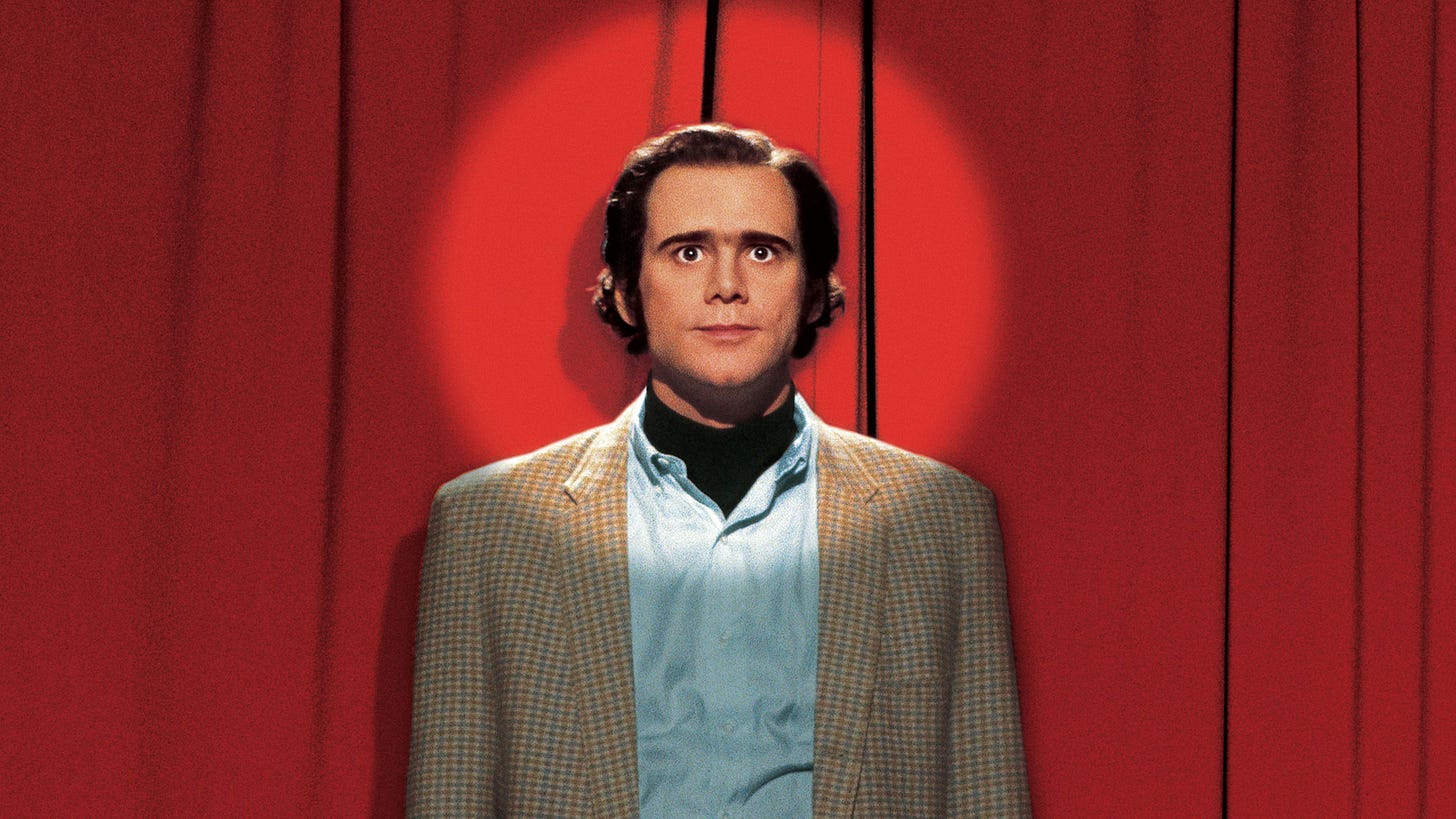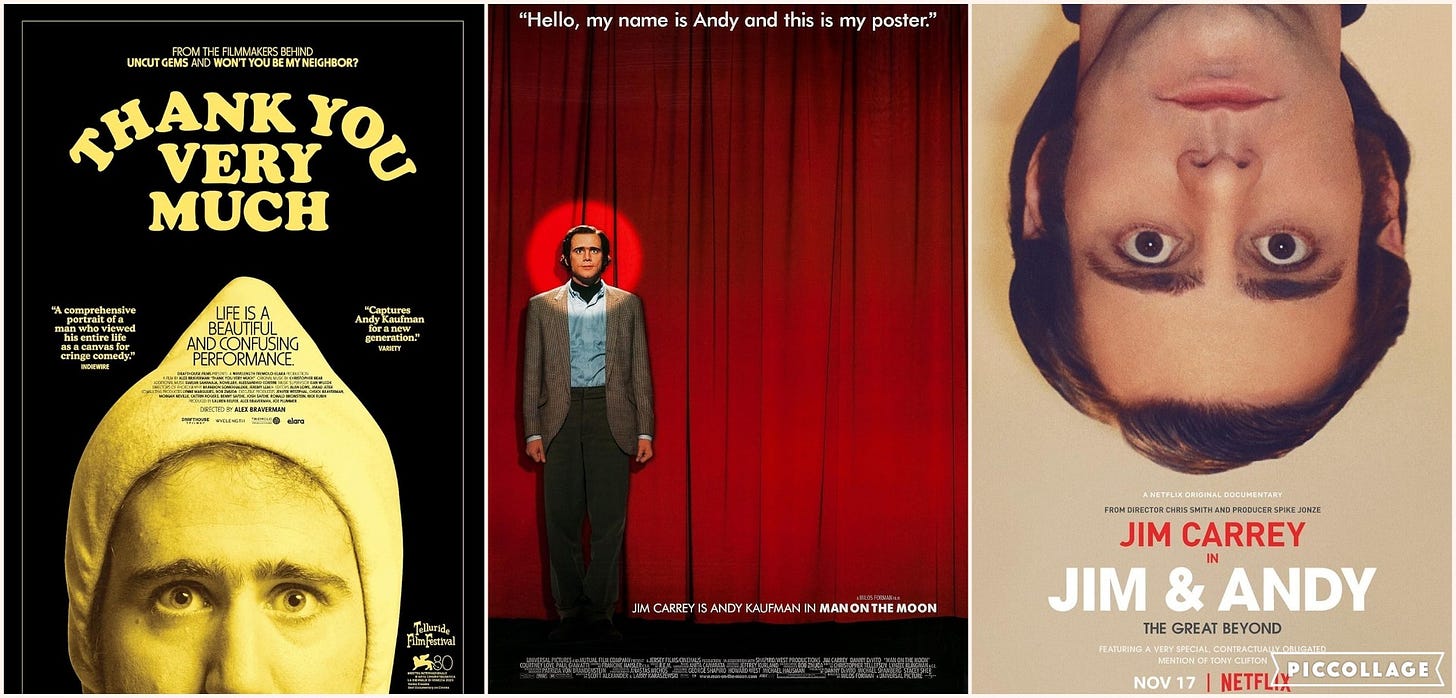Man on the Moon (1999) “Mr Andy Kaufman’s gone wrestling. Yeah-yeah-yeah-yeah”
“I think of the world as, as an illusion, and we shouldn’t take ourselves so seriously”

Writing in the Chicago Sun Times in 1999, Roger Ebert is quoted as follows:
“What is most wonderful about ‘Man on the Moon,’ a very good film, is that it remains true to Kaufman’s stubborn vision. Oh, it brightens things up a little…But essentially it stays true to his persona: A guy who would test you, fool you, lie to you, deceive you and stage elaborate deceptions, put-ons and hoaxes”.
Thus is Man on the Moon and a quarter of a century since release age has not withered this magnificent film nor dimmed the impact or importance to the art of comedy of the one and only, Andy Kaufman. Prior to watching this film for the first time I had no knowledge of who Andy was or his place in the history of comedy. If my fading memory recalls, I rather stumbled onto the film via my love of REM (whose songs Man on the Moon and The Great Beyond top and tail the film brilliantly) but a near quarter century of fandom for all things Andy Kaufman has followed and historical inaccuracies or not, a showreel of his greatest absurdist hits are all contained within a movie that still stands the test of time all these years later. From Foreign Man to The Animal Song, Mighty Mouse to milk and cookies after his performance at Carnegie Hall, all of this and much more besides is faithfully recreated within the film which has pleasingly now spawned an after-life all of its own following my recent viewing of the 2023 documentary on his life entitled “Thank You Very Much”. I couldn’t help but extol the virtues of this incredible documentary (directed by Alex Braverman) to my beautiful son who pleasingly insisted we watch Man on the Moon together and only after first watching Youtube clips of the great man AND the 2017 documentary Jim and Andy: The Great Beyond (directed by Chris Smith).
The enduring power of Andy Kaufman, ladies and gentlemen.
As is my certainty that if I wish to rouse my son from a fit of pique or a bout of melancholia, I need only sing “Here I come to save the day!” and Andy Kaufman’s Mighty Mouse is riding to the rescue once more! Don’t believe me? Wait until you see this scene in the movie or better still the Thank You Very Much documentary. Guaranteed to put a smile on your face, even if it is absurdly silly.
Much like its genius creator.

Here are the opening 14 minutes to Man on the Moon:
Opening in black and white and with a deliberately skittish, awkward and nervous “Andy Kaufman” (Jim Carrey) staring directly at the camera, after the first of a series of awkward pauses he finally adopts the first character of many to appear that will litter this surreal and brilliant film, and his own self-titled “Foreign Man” introduces us to the absurd world and eventually the early life of a genius by the name of Andy Kaufman:
“Hello, I am Andy and I would like to thank you for coming to my movie. I wish it was better, you know, but it is so stupid, it is terrible, I don’t even like it. All of the most important things in my life are changed around, mixed up, for dramatic purposes. So, I decided to cut out all of the baloney. Now the movie is much shorter. In fact, this is the end of the movie.
Thank you very much”
With a traditional head bow follows a long pause. Not blinking. Staring straight at the camera.
“I am not joking. Goodbye. Go”
Head down, Andy now walks to the left of the screen and as the camera follows him slowly, so a record player comes into focus and with Andy dropping the needle on a record he retreats slightly to the right and now centre of the screen as the closing credits of the movie begin to scroll in a yellow font over the continuing music from the record player. Silently and deliberately awkwardly staring straight at the camera, Andy gulps nervously before looking to his left and then to his right, as the awkwardness of the surreal beginning to the film unravels with both the music and the closing credits coming to an abrupt and early end partway through the credits. Repeating the process of earlier, Andy simply walks back to the record player and after placing the needle at the beginning of the song, the closing credits resume as he again stands awkwardly still, swallowing nervously and staring deadpan straight ahead at the camera without a shred of emotion. Now checking his watch as he knows that yet again the music will finish before the conclusion of the credits, he returns to the record player when the music has finished and now scratches the needle across the vinyl record. As he does so the closing credits move in time with the needle movements on the record until he leaves both the music and credits to continue until yet again, the music concludes before the completion of the credits. Returning to the record player, he now closes the lid.
Fade to Black.
After a long, silent pause, Andy now peers from the left hand side of the screen and in somewhat of his own voice:
“Wow, you’re still here!”
Andy moves excitedly to the middle of the screen.
“OK! I hope you’re not upset. I did that just to get rid of the folks who just wouldn’t understand me, and don’t even want to try. Actually, the movie is really great!”
Andy now moves to the right of the screen and as the camera follows him slowly, a projector appears.
“It’s just filled with colourful characters, just like the one I did just then, and the one I’m doing now. Our story begins in Great Neck, Long Island”
As Andy excitedly peers through the light of the projector and accompanied by the earliest stirrings of REM’s iconic “Man on the Moon” we dissolve into 4:3 aspect ratio cinefilm footage of Andy’s earliest childhood memories as he continues a brief narration of the family house, car, his younger brother and sister and with the cinefilm ending on his mother the film itself begins with his father “Stanley Kaufman” (Gerry Becker) arriving home from work and immediately ascending the stairs of the family home and into Andy’s bedroom. Childhood Andy, dressed immaculately and even as a young child, wearing a bow-tie, is first seen bouncing on his bed as he performs his “television show” to his bedroom wall before standing to a somewhat attention in the presence of his father who is far from happy. With young Andy now looking nervously at the floor, his father exclaims “This has got to stop. Our house is not a television studio” before continuing that his solo activities in his bedroom are not healthy. Go play outside his father continues, adamant that his behaviour cannot continue in this vein. Andy too is equally adamant. His bedroom wall is his audience. His bedroom is his television studio. For Andy to continue, his father insists that he must have an audience.
We cut to Andy dragging his little sister Carol from her bedroom and into his and quickly, Andy, now with an audience, begins “The Animal Song” to the very great amusement of his younger sister but less so a sparse audience of adults in a comedy club as we leap forward to almost present day and Andy performing the same song for a tiny crowd of largely bored comedy goers. With barely a ripple of applause, we cut immediately to Andy now leaving the comedy club, passing the manager with a somewhat rhetorical question and same time tomorrow night? “I don’t know, Andy” the manager responds, “I think I gotta let you go”. Crestfallen and close to tears, as the manager describes his act as “amateur hour”, Andy retorts that his act isn’t comedy and is in fact art and totally original. So original responds the manager that people were leaving midway through his act. He’s not selling beer or making money on his act, whatever it may be, and suggests Andy incorporate “blue material” in his act as he also proffers a joke to which Andy flatly refuses to believe is remotely entertaining or indeed funny. Leaving without a further word between them, Andy is now seen storming through the exit door of the club and seemingly on the verge of tears until…he breaks out in a huge beaming smile of celebration.
He’d burned another bridge and his career of deliberately fooling people was only just beginning!
Cutting now to the “Improvisation” comedy club, Andy nervously enters the stage to a packed house and with barely a smattering of applause. With his hair slicked back and wearing a purple jacket and carrying a guitar, we cut to “George Shapiro” (Danny DeVito) eyeing this latest arrival on stage before returning to Andy as he reels off a string of poor jokes and imitations in the style of his “Foreign Man” character. Cutting back and forth from Andy to George Shapiro and Andy to the audience as a whole, there is barely a ripple of applause, just bewilderment at the awkward man on the moon of his own stage, stopping and starting, deliberately and awkwardly stumbling through his array of imitations and with the audience growing ever colder towards him, Andy announces “Now I would like to do for you, the Elvis Presley”. Cue groans from the crowd as Andy turns his back on the audience before turning on a tape recorder and slowly peeling away his current trousers to reveal the iconic white trousers of Elvis below and now the jacket too before a furious combing and brushing of his hair into the style of the great singer he is about to imitate and with a look at the audience and a distinctive Elvis style lip curl, he explodes into a pitch perfect impression of “The King” as he serenades a raucous audience with a rendition of “Blue Suede Shoes”, bringing the house down in triumphant cheers. He’d fooled them again!
And now again as he returns to the microphone and in the voice of “Foreign Man” once more, utters his immortal line of:
“Thank you very much!”
Andy Kaufman, the original showman almost like no other, had fooled his audience all over again…
Thanks for reading. I hope this message in a bottle in The Matrix finds you well, prospering, and the right way up in an upside down world.
Whilst you’re here I may as well brag about the release of my trilogy of recently self-published books. Beautiful covers eh! As the title(s) would suggest, this is my life at the movies or at least from 1980 to 2024, and in volume 1 you’ll find 80 spoiler free appraisals of movies from debut filmmakers, 91 of the very best films appraised with love and absent of spoilers from 1990–2024 in volume 2, and in volume 3 you’ll find career “specials” on Paul Thomas Anderson and Quentin Tarantino together with the very best of the rest and another 87 spoiler free film reviews from 2001–2024.
All available in hardback and paperback and here are some handy links:
"A Life at the Movies Vol.1" - link to Amazon
"A Life at the Movies Vol.2" - link to Amazon
"A Life at the Movies Vol.3" - link to Amazon





